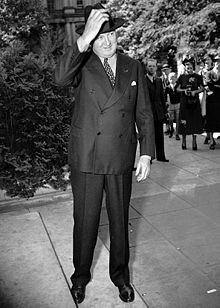James Farley
James Aloysius "Jim" Farley (born May 30, 1888 in Grassy Point , Rockland County , New York , † June 9, 1976 in New York City ) was an American politician .
biography
After graduating from Packard Commercial School, Farley began his career as a township clerk in his home parish of Grassy Point from 1912 to 1919 and was elected three times to this office. During this time he also rose within the Democratic Party and was actively involved in Al Smith's election campaign . When he was first governor of New York in 1919 , Farley was appointed director of the New York harbor ; he held this office until his abolition by Smith's successor as governor, Nathan Lewis Miller . In the following years he was chairman of the Democratic Party in Rockland County. Between 1923 and 1924 he was a member of the New York State Assembly for a term . In 1928 he became secretary of the Democratic Party of New York State and, as such, was also the organizer of the successful election campaign for Franklin D. Roosevelt for governor of New York. In 1930 he was the manager of the Roosevelt re-election campaign and was also elected leader of the New York State Democratic Party.
Convinced that Roosevelt could also win the 1932 presidential election , Farley traveled to seek US support. At the Democratic National Convention in Chicago , he also arranged the agreement with the Speaker of the House , John Nance Garner that this nomination as candidate for the office of US Vice-President would be obtained if Roosevelt supporting the delegation from Texas and California would get. In 1932 he became chairman of the Democratic National Committee , the national organization of the Democratic Party, which also does fundraising and represents the political positions of the party as a whole. Farley held this office until 1940.
As chairman of the Democratic National Committee, he also led Roosevelt's successful presidential campaign. After his election as US president Farley was from that on March 4, 1933, Postmaster General ( General Post Master ) in his Cabinet appointed. He also led the successful campaign for Roosevelt's re-election in the 1936 presidential election . However, a rift gradually developed between the President and Farley during this period. This spoke out at the National Convention in Chicago in 1940 against a third candidacy by Roosevelt and resigned as Minister of Post on September 10 of the same year.
In 1944, as chairman of the New York Democratic Party, he spoke unsuccessfully at the Democratic National Convention against Roosevelt's fourth candidacy for US President. He then withdrew from politics. He published his autobiographies in 1938 under the title "Behind the Ballots" and in 1948 under the title "Jim Farley's Story".
Farley, a devout Catholic, was also a member of some social and sociopolitical Catholic organizations such as the Ancient Order of Hibernians , the Fraternal Order of Eagles , the Benevolent & Protective Order of the Elks , the Friendly Sons of St. Patrick and the Knights of Columbus . Most recently he was a member of the Dutch Treat Club from 1966 to 1976 . Mount Farley , a mountain in Antarctica , is named in his honor .
The Farley archive he developed for collecting and researching former personal relationships became proverbial.
Web links
- James Farley in nndb (English)
- James Farley in the Miller Center of Public Affairs of the University of Virginia (English)
- Newspaper article about James Farley in the 20th century press kit of the ZBW - Leibniz Information Center for Economics .
| personal data | |
|---|---|
| SURNAME | Farley, James |
| ALTERNATIVE NAMES | Farley, James Aloysius (full name) |
| BRIEF DESCRIPTION | American politician |
| DATE OF BIRTH | May 30, 1888 |
| PLACE OF BIRTH | Grassy Point , New York |
| DATE OF DEATH | June 9, 1976 |
| Place of death | New York City |


